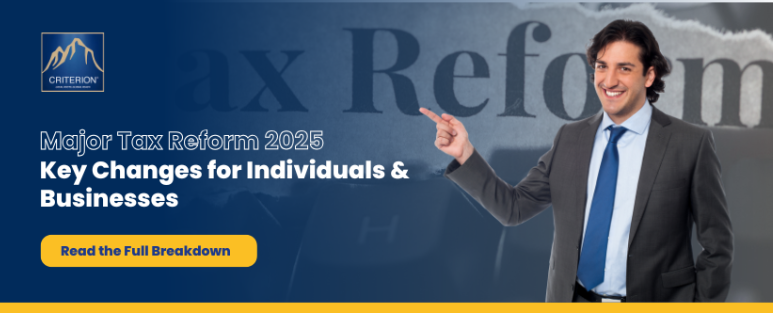
Major Tax Reform 2025: Key Changes for Individuals & Businesses
- On March 29, 2025
An allied resolution in the House received limited passage by a vote margin of 217-215 to put fundamental tax changes into motion which affect many Americans. The proposed tax reform bill starts its Senate debate about individual tax breaks and corporate tax rate reduction and general fiscal decision making.Such proposed taxation modifications would transform both personal and business taxation while affecting economic growth patterns and investor decisions and household budgeting choices.
The central element of this bill seeks to continue implementing essential aspects of the Tax Cut and Jobs Act (TCJA) from 2017 that granted face-lifting tax reductions for people and corporations. External time limits will dissolve the tax benefits that started in 2017 which will result in higher payment obligations for personal homes along with commercial entities.
The current bill advances dual initiatives to maintain existing tax reductions alongside initiatives to boost family welfare alongside business investments that would bolster economic performance. Federal tax policymakers need to evaluate whether increased tax relief benefits outweigh their concerns about rising national deficits during ongoing U.S. tax law discussions. Given the impact of the current policy,taxpayers together with businesses and financial professionals need to maintain awareness about current legislative advancements because they will influence upcoming financial changes.
Individual & Family Tax Cuts
Extension of 2017 Tax Cuts
Major Tax Reform 2025 contains an essential element by prolonging the individual tax rate reductions introduced through the 2017 tax cuts. These tax reductions were scheduled to expire at the end of 2025 but Major Tax Reform 2025 intended to preserve them for American taxpayers.
Main features in Major Tax Reform 2025 ensure that the 2017 Tax Cuts and Jobs Act individual tax rate reductions survive post-2025. These tax cuts which started in 2025 are intended to provide tax rate reductions for numerous Americans. Higher tax rates will apply to all Americans if the extension is not approved because it will increase their financial challenges. This proposed tax reform maintains current reduced individual tax brackets to provide long-term tax benefits for Americans throughout the population. This proposed reform stops tax hikes which maintains financial stability while leaving greater amounts of money within taxpayer possession to support the 2017 introduced financial benefits.
Expanded Child Tax Credit (CTC)
The Child Tax Credit (CTC) receives more available benefits through increased refundability under proposed extension legislation that benefits more families. The update introduces financial assistance that will reach millions of families who are members of the low- and middle-income groups. Through this enhancement of refundability the reform enables families to utilize their tax credits to pay for basic needs thus improving their economic situation.
Marriage Penalty Relief
Under this bill the tax brackets for married couples who file together received adjustments that eliminate the penalty associated with their marital status. In the past couples needed to pay more taxes than individual filers during their joint filings. The provision adopts expanded income thresholds to allow couples greater personal savings and reduces their tax filing burden and financial pressure from dual-income families.
Higher Standard Deduction
People retain their tax benefits by maintaining a double standard deduction value per the Tax Cuts and Jobs Act which enables them to pay less income tax.
- Single filers: $15,000 (increase of $400)
- Married couples filing jointly: $30,000 (increase of $800)
- Heads of households: $22,500 (increase of $600)
Business & Corporate Tax Benefits
Full Expensing for Capital Investments
100% bonus depreciation exists in the reform bill which gives businesses immediate write-offs for capital costs including equipment and technology and machinery. The provision boosts economic expansion by minimizing corporate tax obligations which activates business expansion and modernization leading to innovation and productivity increases with employment generation as a result.
Unlock Your Business’s Full Potential with Expert Tax Strategies!
R&D Tax Deduction Expansion
The existing tax rules demanded businesses to spread their research and development (R&D) costs over five years before obtaining tax benefits. Under the new tax reform businesses can cut total expenses from performing domestic R&D research directly from their income during the current tax year. Businesses now have stronger motivation to innovate because the new incentives make it simpler to fund research development projects which contributes to technological progress together with increased U.S. market competitiveness.
Pass-Through Business Tax Relief
Small businesses together with partnerships and sole proprietorships who operate as pass-through entities continue to obtain the 20% Qualified Business Income (QBI) deduction. Through this measure business owners achieve tax reduced earnings which they can reinvest for growth together with creating employment opportunities. The reform keeps this deduction active to bolster both entrepreneurship and rise in economic activity across the U.S.
Corporate Tax Rate Stability
Through this reform the corporate tax rate at 21% becomes stable because it remains exactly where the 2017 tax cuts placed it. Businesses who keep their rates competitive can execute long-term investments with better certainty. The established tax rate remains stable under the reform which enables positive business growth together with job development and an optimized business landscape and predictable tax policies.
Unlock Your Business’s Full Potential with Expert Tax Strategies!
Other Key Tax Provisions
Other Key Tax Provisions
The 2025 tax reform provides an extended higher estate tax exemption as one of its main provisions. Through this provision families can transfer larger amounts of assets to their descendants without needing to pay high taxes. Through its extension the provision grants individuals in estate planning additional flexibility for wealth transfer purposes while securing their assets against substantial tax burdens for future beneficiaries.
State and Local Tax (SALT) Deduction Cap Remains
State and local tax (SALT) deductions are limited to $10,000 by law through the recent tax legislation. Residents in states including California, New York and New Jersey continue to face taxation limitations because of this policy even though these states pay higher taxes than the allowed amount. The SALT caps continue as a major point of controversy because legislators support either raising or eliminating this restriction but have yet to achieve consensus on the matter.
International Tax Adjustments
Various mechanisms exist in the bill to stop multinational corporations from shifting their profits toward tax-free locations. The government continues to support regulations that stop companies from evading taxes through offshore loopholes to guarantee big businesses fulfill their tax obligations in the United States. The modifications lead to fair competition which supports the maintenance of federal tax earnings.
Alternative Minimum Tax (AMT) Adjustments
- Unmarried individuals: $88,100 (phase-out at $626,350)
- Married filing jointly: $137,000 (phase-out at $1,252,700)
- Married filing separately: $68,650
The Adjustments of Earned Income Tax Credit (EITC) provide enhanced tax benefits.
Taxpayers who have three or more children now qualify for an Earned Income Tax Credit with its maximum value set at $8,046. Additional financial support through higher Earned Income Tax Credit (EITC) benefits low- and moderate-income families that are working to promote tax reduction and increase household earnings.
Foreign Earned Income Exclusion
The foreign earned income exclusion now reaches $130,000 for American expatriates which reduces their taxes when they work outside the United States. The provision supports Americans to keep their financial stability when they reside and work outside the United States.
Potential Fiscal Impact
According to the proposed 2025 tax policy reforms the government will offer financial help together with economic development yet these changes present substantial financial effects. Economic analysts predict the proposed debt reform legislation will create an increase of $2.8 trillion to America’s national debt throughout the subsequent ten years. Given the fiscal year framework, the proposed tax cuts could enhance consumer consumption and industrial investment although questions persist about long-term tax revenue depreciation. The Senate plans to discuss the bill which will evaluate how economic stimulus measures weigh against projected federal debt surmounting. Lawmakers must strike a proper alignment between tax reductions along with government money requirements and financial reliability for achieving sustainable economic balance.
What This Means for You
Individuals & Families
Tax reforms proposed for individuals and families will deliver substantial monetary gains to them. By lowering tax rates along with the extension of deductions individuals maintain more of their financial earnings. The heightened Child Tax Credit benefits numerous families who exist in the lower- and middle-income ranges by reducing their expenses for child spending. Above all the raised standard deduction creates simpler tax filing processes which leaves more income unaffected by taxation..
Businesses & Corporations
Businesses find these tax modifications create vital opportunities to motivate their expansion throughout the market. The ability to expense capital investments through full deductions enables companies to write off equipment costs right away thus promoting economic expansion. Businesses can anticipate long-term expectations and planning stability from the current corporate tax rate at 21%. Pass-through businesses will maintain the 20% Qualified Business Income (QBI) deduction which reduces taxed income to reinvest in operational growth and increasing their workforce.
Individuals & Families
Tax reforms proposed for individuals and families will deliver substantial monetary gains to them. By lowering tax rates along with the extension of deductions individuals maintain more of their financial earnings. The heightened Child Tax Credit benefits numerous families who exist in the lower- and middle-income ranges by reducing their expenses for child spending. Above all the raised standard deduction creates simpler tax filing processes which leaves more income unaffected by taxation..
Businesses & Corporations
Businesses find these tax modifications create vital opportunities to motivate their expansion throughout the market. The ability to expense capital investments through full deductions enables companies to write off equipment costs right away thus promoting economic expansion. Businesses can anticipate long-term expectations and planning stability from the current corporate tax rate at 21%. Pass-through businesses will maintain the 20% Qualified Business Income (QBI) deduction which reduces taxed income to reinvest in operational growth and increasing their workforce.
Next Steps: What You Should Do
As the 2025 tax reform approaches, proactive planning is essential. Take these steps to maximize benefits:
Review Your Tax Strategy – Work with a tax expert to identify deductions and credits that apply to you.
Optimize Business Investments – Take advantage of expanded expensing rules to reduce taxable income.
Stay Informed – Monitor Senate decisions to adapt your tax plan accordingly.
Need expert guidance? Schedule a free consultation with our tax professionals at our CPA firm today to ensure you’re prepared for these major changes.
Final Thoughts
Changes introduced by the Major Tax Reform 2025 proposal currently affect individual and corporate taxpayers by reforming tax rates including business-related deductions and corporate regulations. Lawmakers’ final bill requires public attention because information will help identify advantages and unexpected consequences.
Business owners together with taxpayers need to plan ahead to benefit from the changes. Having both tax compliance and efficiency ensures improved results which saves your time and monetary resources. The time to meet with our tax planning professionals about expert guidance through these modifications occurs right now. Make forward-thinking decisions that bring you financial certainty in the future.
FAQ
1. What are the key changes in Major Tax Reform 2025?
Major Tax Reform 2025 includes the extension of 2017 individual tax cuts, an expanded Child Tax Credit, adjustments to marriage penalty relief, higher standard deductions, and significant business tax benefits such as full expensing for capital investments and R&D tax deduction expansion.
2. How will the tax reform impact individuals and families?
The reform helps individuals and families by maintaining lower tax rates, increasing the Child Tax Credit, and raising the standard deduction. These changes aim to reduce overall tax burdens and provide greater financial stability.
3. What benefits does the tax reform offer to businesses?
Businesses can benefit from continued 21% corporate tax rates, full expensing for capital investments, R&D tax deduction improvements, and the 20% Qualified Business Income (QBI) deduction for pass-through entities. These provisions encourage investment and job creation.
4. Will the estate tax exemption change under the new tax reform?
Yes, the estate tax exemption remains extended, allowing families to transfer larger assets without high taxation. This helps individuals with estate planning and wealth transfer while reducing tax liabilities.
5. How should taxpayers and businesses prepare for these tax changes?
Taxpayers and businesses should review their tax strategies, optimize investments based on new deductions, and stay informed about legislative updates. Consulting a CPA firm can help navigate these changes and maximize tax benefits.



